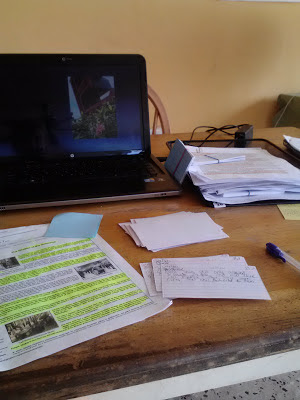A Teacher's Research Rant
Time for a teacherly rant.
I hate teaching research.
Hate it, hate it, hate it.
It’s taken me only a year of experience to come to this
realization.
Let me back-track.
When I started teaching, writing a research paper was one of the things
I was most excited to teach. When I was
in school, I loved finding information, organizing it in a different way,
putting my own spin in it, and spitting out a research paper. In my opinion, writing a research paper is
simply a process—and one which requires very little deep thought, especially
when you’re in middle or grade school and aren’t really expected to add any
ideas to the research of others.
Here’s what I’m learning: writing a research paper DOES take
extensive critical thinking skills, and it’s not as easy for everyone as it is
for me.
 |
| My Saturday. |
Step 1: Find scholarly sources of information for your
topic. Check. This is pretty easy for my students, after I
guide them about how to identify sources they can trust.
Step 2: Highlight the important information from the source,
and then take notes on notecards. One
paraphrased fact goes on each notecard.
This is currently the step we’re on
in class, and it’s a beast. No matter
how much we practice paraphrasing similar articles in class, many of them
either don’t get it, or get lazy when it comes to taking their own notes. To prevent unintentional plagiarism, I’m going
through each of the students’ notecards and checking them with their
sources. I can’t tell you how many times
I’ve written, “This is a quote, not a paraphrase! Re-word.”
The problem is that much of the
time, my students don’t really understand what they’re reading. They see words they don’t know, and rather
than looking them up, they just write down the sentence—assuming it must be
important. This results in two
problems. One is obvious; they’re
quoting rather than paraphrasing. The
second has to do the actual information they end up taking notes on. Because they don’t understand the whole
article, they miss the most important parts!
I’ve read notes on Anne Frank that never mention she was in hiding for
two years, and notes on other Holocaust survivors that never explain what
happened to the person during the actual Holocaust.
Step 3: Organize your notecards by
subtopic, and then put them in a logical order.
When I write a research paper, this is the fun part for me. I love combining information from multiple
sources in a way that makes sense, and the notecard method makes it so easy to
chop up the info. and re-compile it. It’s
harder for students to grasp. All their
notecards are labeled by source. Mixing
up information from each source is sometimes hard for them to do. Also, going back to the fact that they don’t
understand what they’re taking notes on, sometimes their organization is
severely lacking.
Step 4: Write an outline. This should be easy, because all the facts
are there already, in order, organized by subtopic (which is essentially
organized by body paragraphs). And yet
it takes them forever.
Step 5: Write a rough draft. We’re not there yet. I can’t comment on this year’s
difficulties. Last year I had a lot of
plagiarism because students didn’t understand paraphrasing, though. I’m hoping they take my comments on their
notecards to heart and it’s not such an issue this year.
Step 6: Peer-edit. Always a borderline waste of time…students
aren’t the best at catching each other’s errors and leaving constructive
criticism. They’re pretty good at
complimenting each other, which is a good thing, though.
Step 7: Revise and edit and complete
a final draft.
Step 8: Revise again and turn in a 2nd
time to get a better grade on the final draft.
I believe in letting students do this, because the point should be that
they’re creating quality work, not that they’re getting it right by the
deadline, or on the first try. Of course
it makes for more grading for me, though.
That’s the trade-off.
Second semester’s poetry unit can’t
come quickly enough.
This unit is worth it, and I hope they
each take something from it and remember how to write a solid research paper in
the future. I will probably teach a
research unit every single year that I am a teacher. I will continue to hate
it, unless I eventually discover the magical way to present the information so
everyone “gets it” right away. But I
know it’s a skill my students need to have—especially if they have any desire
to go to college one day.
So, I plod along. Giving up my Saturday in favor of banging my
head on the table at the misquoted and mis-paraphrased information on student
notecards.
Cheers to the weekend!



Comments
Post a Comment